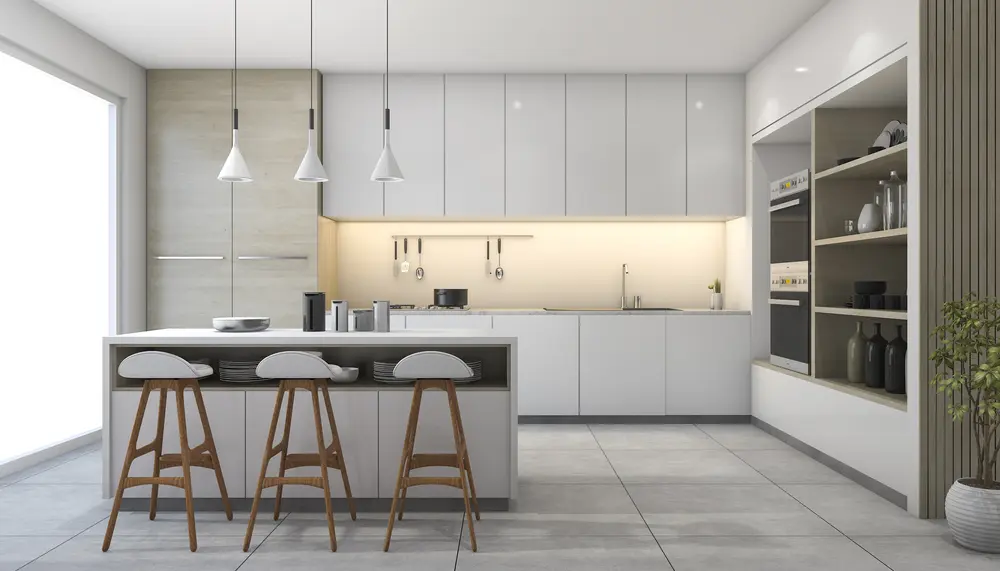The Experts Explain: Kitchen Planning and Designing for Beginners
What kind of questions should you ask before planning a new kitchen? What’s important to know? What kind of materials are available on the market, and what are their advantages and disadvantages? Before you start planning the heart of the house, you should make sure to take note of several things. Read more on Israel Eisner’s blogpost, planning and customer service coordinator.

The kitchen is the beating heart of any home. This is where we spend most of the hours of the day; cooking, baking, eating, hosting and spending quality time with our family. So, how do you even start planning the kitchen? What should you pay attention to? What are the differences between different kitchen surfaces? We’ve got our Tidhar specialist to explain everything you need to know!

The kitchen is known as the beating heart of the house for a good reason. Typically, the standard kitchen included in the apartment plans received by Tidhar include lower cabinets with a dedicated space for a built-in dishwasher, and tall built-in cabinet (with a dedicated space for a microwave) or a similar unit, and several upper cabinets or shelves.
It’s our utmost priority to ensure our clients are satisfied and have a kitchen that meets their needs, lifestyle and preferences. If you can’t find the solution that’s right for you among the options presented, together, we’ll try to find what suits best for you.
What Should You Consider Before Your Next Meeting Concerning Your Kitchen?
Your kitchen is a small “factory” and the different elements in it need to be properly aligned and working. In order to tailor your kitchen to your home, you should ask a few preliminary questions: How active is your kitchen? Do you cook in it daily? How many people cook in your kitchen at the same time, and in general, how many people are in the kitchen daily? Do you enjoy hosting, and how frequently do you do it?
There are a couple of important basic things to note: planning convenient surfaces next to the stovetop, the placement of the oven, refrigerator and sink, and fitting a built-in unit for the oven and microwave. Make sure to leave enough storage space and verify the location of each detail and element. Additionally, it’s crucial to examine whether there are fixed devices on the countertop (such as a water bar), whether there are additional work devices that need to be stored (such as a mixer), and the opening directions of the upper cabinets.
Remember that adding an island to the kitchen depends on the size of the space and the size of the apartment. Sometimes you might have to give up the island, even if it’s your dream, as it could “reduce” the space and limit movement. Everything depends, of course, on the overall planning. If you choose to install an island in the kitchen, check – are highchairs comfortable for you? Is it convenient for children to climb up and down the chairs?
Kitchen Planning Process
The process includes a meeting with us, and then a meeting at the kitchen design company with which we collaborate on this project. Together we can achieve the best result. At the kitchen design company, you’ll focus on the functional and aesthetic aspects, while at the meeting with us, we’ll discuss the collaboration and coordination of all the systems necessary in order to create one perfect space.

Materials – Advantages and Disadvantages
Traditionally, the most common material for kitchen cabinets in Israel is plywood. It consists of layers of thin wood sheets glued together, making it highly durable. The veneer of the wood panels can be chosen from a variety of materials available on the market today, offering a good way to upgrade the appearance of your new kitchen.
Formica Kitchen: Durable and budget friendly. Formica is easy to clean and available in a variety of new textures. It’s especially resistant but cannot be framed.
Epoxy Kitchen: Flexibility in design – doors can be ordered in any design you desire. Epoxy kitchens are considered expensive and sensitive to cleaning materials. In our opinion, it is the least resistant material.
Solid Wood Kitchen: Solid wood has regained its popularity and allows for a wide range of designs. Using solid wood creates a warm atmosphere. It’s rather durable but sensitive to scratches and requires extensive maintenance.
Veneer Kitchen: A relatively inexpensive alternative to solid wood. There is a large variety of types that can be used. Veneer finish is a good option only if you have smooth doors. Veneer allows for blurring of scratches or dents but requires high maintenance.
Polymer Kitchen: Polymer offers a rich variety of design options at a realistic price level. It has high durability, and stains are hard to notice on certain models, but compared to Formica, it is sensitive to scratches.
Glass Kitchen: This material is recommended for a clean and sleek design, suitable for a modern style. Glass doors can have prints and patterns. The cost is relatively high. Despite their resistance to dents, fingerprints and stains can be easily visible on the glass.
Kitchen Work Surfaces
The kitchen countertop is an integral part of the design and planning process. At Tidhar you can mostly choose a quartz countertop or alternatively, if you opt for an upgraded option – granite, Dekton, Corian, or stainless steel.
Island Countertop
There is a wide variety of materials for island countertops, including a combination of several. When the island doesn’t have stovetops or a sink, the choice is typically between quartz and stainless steel.
Legal Note: The information presented below is general information only for marketing purposes, does not constitute a statement and/or commitment and/or advice from the Tadhar Group and/or anyone on its behalf and does not constitute a substitute for legal and/or economic and/or other advice. The one who uses this information does so at his own risk. All the contents included on this page do not contain any recommendation or opinion, and are not intended to provide anything but general and marketing information and impression means only. Tadhar Group and/or anyone on its behalf are not and will not be responsible for the information provided below and/or its correctness. In any case, the person who makes use of the information and/or who makes his decisions based on the information, does so at his own risk, and he waives any demand and/or claim and/or claim against the Tadhar Group and anyone on its behalf and/or any of its affiliated companies, in all matters related and involves relying on the information in this booklet. T.L.H.



